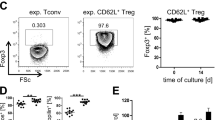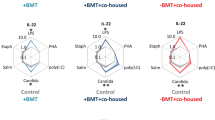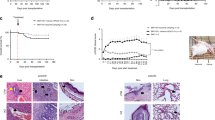Summary:
Graft-versus-host disease (GVHD) is the major obstacle for successful allogeneic stem cell transplantation (SCT). Morbidity and mortality are high, and novel therapeutic strategies are required. Current therapy, which is based mainly on immunosuppression, is associated with a high degree of complications. Immune hyporesponsiveness induced by oral antigen administration has recently been shown to prevent the development of chronic GVHD (cGVHD) in a murine model. The aim of the present study was to evaluate whether it is possible to induce tolerance and to alleviate GVHD in a semiallogeneic transplantation model in mice. GVHD was generated by infusing 2 × 107 splenocytes from C57BL/6 donor mice into (C57BL/6 × Balb/c)F1 recipient mice, which received 7 Gy 60Co total body irradiation (TBI) prior to transplantation. Oral tolerance was induced by feeding recipient F1 mice with five oral doses of proteins, 50 μg/mouse, extracted from C57BL/6 splenocytes on alternate days following transplantation. In vitro mixed lymphocyte reaction (MLR) from tolerized and nontolerized mice was performed. Recipient mice were followed for chimerism, and for clinical and histological parameters of GVHD. Induction of tolerance was documented by a significant reduction in MLR response of tolerated vs nontolerated splenocytes. A significant alleviation of the clinical and pathological manifestation of GVHD was observed in the liver, small bowel, and skin. Tolerance induction did not jeopardize engraftment. These results may constitute a step towards reducing the frequency of GVHD via manipulation of the immune system.
This is a preview of subscription content, access via your institution
Access options
Subscribe to this journal
Receive 12 print issues and online access
$259.00 per year
only $21.58 per issue
Buy this article
- Purchase on Springer Link
- Instant access to full article PDF
Prices may be subject to local taxes which are calculated during checkout



Similar content being viewed by others
References
Ferrara JLM, Deeg HJ . Graft versus host disease. N Engl J Med 1991; 324: 667–672.
Vogelsang GB . Graft versus host disease: implications from basic immunology for prophylaxis and treatment. Cancer Treat Res 1997; 77: 87–97.
Weiner HL . Oral tolerance: immune mechanisms and treatment of autoimmune diseases. Immunol Today 1997; 18: 335–343.
Strobel S, Mowat AM . Immune response to dietary antigens: oral tolerance. Immunol Today 1998; 4: 173–181.
Nagler A, Pines M, Abadi U et al. Oral tolerization ameliorates liver disorders associated with chronic graft versus host disease in mice. Hepatology 2000; 31: 641–648.
Massi D, Franchi A, Pimpinelli N et al. A reappraisal of the histopathologic criteria for the diagnosis of cutaneous allogeneic acute graft-vs-host disease. Am J Clin Pathol 1999; 112: 791–800.
Howell CD, Yoder TY, Vierlinng JM . Suppressor function of liver mononuclear cells isolated during chronic graft versus host disease. Cell Immunol 1992; 140: 54–66.
Ilan Y, Gotsman I, Pines M et al. Induction of oral tolerance in splenocyte recipients towards pre transplant antigens ameliorates chronic graft versus host disease in a murine model. Blood 2000; 95: 3613–3619.
Ilan Y, Weksler-Zangen S, Ben-Horin S et al. Treatment of experimental colitis by oral tolerance induction: a central role for suppressor lymphocytes. Am J of Gastroenterol 2000; 95: 966–973.
Ilan Y, Prakash R, Davidson A et al. Tolerization to adenoviral antigens permits long term gene expression using recombinant adenoviral vectors. J Clin Invest 1997; 99: 1098–1106.
Gotsman I, Beinart R, Alper R et al. Induction of oral tolerance towards hepatitis B envelope antigens in a murine model. Antiviral Res 2000; 48: 17–26.
Ghobrial RR, Hamashima T, Wang ME et al. Induction of transplantation tolerance by chimeric donor/recipient class I RT1.A molecules. Transplantation 1996; 62: 1002–1010.
Howell CD, De Victor D, Li J et al. Liver T cell subsets and adhesion molecules in murine graft versus host disease. Bone Marrow Transplant 1995; 16: 139–145.
Pines M, Knopov V, Genina O et al. Halofuginone, a specific inhibitor of collagen type I synthesis, prevents dimethylnitrosamine-induced liver cirrhosis. J Hepatol 1997; 27: 391–398.
Woodruff IM, Hansen JA, Good RA et al. The pathology of graft versus host reaction in adults receiving bone marrow transplants. Trans Proc 1976; 8: 675–684.
Ferrara JL . Cytokine inhibitors and graft versus host disease. Ann NY Acad Sci 1995; 770: 227–236.
Hancock W, Polansli M, Zhang J et al. Suppression of insulitis in NOD mice by oral insulin administration is associated with selective expression of IL-4-10, TGF-β and prostaglandin E. Am J Pathol 1995; 147: 1193–1197.
Neurath M, Kelasall BL, Presky DH et al. Experimental Granulomatous Colitis in Mice is Abrogated by Induction of TGFβ-mediated Oral Tolerance. J Exp Med 1996; 183: 2605–2616.
Ilan Y, Sauter B, Roy Chowdhury N et al. Oral tolerization to adenoviral proteins permits repeated adenovirus-mediated gene therapy in rats with pre-existing immunity to adenovirus. Hepatology 1998; 27: 1368–1376.
Gotsman I, Shlomai A, Alper R et al. Amelioration of immune-mediated experimental colitis: tolerance induction in the presence of pre-existing immunity and surrogate antigen bystander effect. J Pharmacol Exp Ther 2001; 297: 926–932.
Shlomai A, Trop A, Gotsman I et al. Immunemodulation of experimental colitis: the role of NK1.1+ liver lymphocytes and surrogate antigen-bystander effect. J Pathol 2001; 195: 498–507.
Nagler A, Barak V, Slavin S . Role of cytokines in graft versus host reaction and rejection following allogeneic bone marrow transplantation. In: Aggarwal BB and Puri RK (eds). Human Cytokines: their Role in Disease and Therapy, Vol. 35. Blackwell Science UK, 1995, pp 153–161.
Krenger W, Hill GR, Ferrara JLM . Cytokine cascades in graft versus host disease. Transplantation 1997; 64: 553–558.
Krenger W, Ferrara JLM . Graft versus host disease and the Th1/Th2 paradigm. Immunol Res 1996; 15: 50–73.
Barak V, Levi-Schaffer F, Nisman B et al. Cytokine dysregulation in chronic graft versus host disease. Leuk Lymphoma 1995; 17: 169–173.
Nagler A, Or R, Kalickman I et al. Elevated inflammatory cytokine levels in bone marrow graft rejection. Transplantation 1995; 60: 943–948.
Tabbara IA, Zimmerman K, Morgan C, Nahleh Z . Allogeneic hematopoietic stem cell transplantation: complications and results. Arch Intern Med 2002; 162: 1558–1566.
Cavazzana-Calvo M, Andre-Schmutz I, Hacein-Bey-Abina S et al. Improving immune reconstitution while preventing graft-versus-host disease in allogeneic stem cell transplantation. Semin Hematol 2002; 39: 32–40.
Acknowledgements
This work was supported in part by the following grants: The Roaman-Epstein Liver Research Foundation; Israel Cancer Research Fund; Israel Cancer Association Research Grant. A grant from ENZO Biochem.
Author information
Authors and Affiliations
Rights and permissions
About this article
Cite this article
Nagler, A., Ohana, M., Alper, R. et al. Induction of oral tolerance in bone marrow transplantation recipients suppresses graft-versus-host disease in a semiallogeneic mouse model. Bone Marrow Transplant 32, 363–369 (2003). https://doi.org/10.1038/sj.bmt.1704145
Received:
Accepted:
Published:
Issue Date:
DOI: https://doi.org/10.1038/sj.bmt.1704145
Keywords
This article is cited by
-
Keratinocyte growth factor ameliorates acute graft-versus-host disease in a novel nonmyeloablative haploidentical transplantation model
Bone Marrow Transplantation (2005)
-
Adoptive transfer of small numbers of DX5+ cells alleviates graft-versus-host disease in a murine model of semiallogeneic bone marrow transplantation: a potential role for NKT lymphocytes
Bone Marrow Transplantation (2005)



